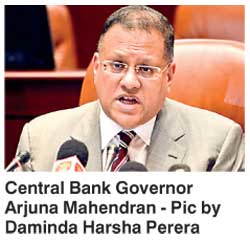Thursday Feb 19, 2026
Thursday Feb 19, 2026
Tuesday, 7 July 2015 02:06 - - {{hitsCtrl.values.hits}}
By Channa Fernandopulle
The Central Bank (CBSL) expects economic growth to pick up during the second half of 2014 following the conclusion of 17 August polls and the resumption of construction projects halted for reassessment.
“Spending on construction during the first quarter was curbed somewhat as a result of the new Government reassessing its priorities in terms of infrastructure outlays but those issues are in the process of being resolved and we hope that by the second half of the year we will see it bounce back. Once the election is held I also see a surge of private sector investment coming through.
A lot of private investors I speak to at the moment are holding back on their investment outlays because of the uncertainties around  the complexion of the new Government and how their policies could change,” Central Bank Governor Arjuna Mahendran elaborated.
the complexion of the new Government and how their policies could change,” Central Bank Governor Arjuna Mahendran elaborated.
Consequently, he expressed confidence that the second half of 2015 would be better than the first and anticipated that the 7% growth target set out in the CBSL Annual Report 2014 was achievable, reiterated that key priorities would be raising Government revenue while minimising the proportion of that revenue which was being channelled into debt servicing.
According to the most recent data from the Central Bank, growth stayed at a flat 6.4% in 4Q14 and carrying over into 1Q15. Expenditure on imports increased by 3.2% in April 2015 while cumulative expenditure rose 1.5% while the trade deficit widened by 15.1% in April and 3.9% from January to April.
Meanwhile the budget deficit declined to 2.4% in 1Q15 as compared with a previous 3.5% of GDP in 2014 boosted by a nominal revenue increase of 14.5% and a 3.8% reduction in expenditure. Core inflation stood at 2.8% in June while headline inflation stood at 0.1%.
Meanwhile in terms of exports, Mahendran acknowledged that export performance had been weak in Sri Lanka, hampered by weak international commodity prices and the European Union’s ban of Sri Lankan fish.
“On the export front I think it’s quite commendable that export performance hasn’t been weaker than we’ve seen already. Sea food exports have been affected by EU ban and that’s a chunk of exports that could have grown faster but exports in general around the world have been fairly weak, especially for commodity exporters.
“Rubber exporters for instance have been affected by price declines and agricultural produce in general has also seen price reductions so against that backdrop our exports have held up reasonably well and the apparel sector has also offset some of the agricultural losses,” he explained.
Commenting further on the EU fishing ban, Mahendran expressed optimism that the legal issues surrounding the ban could be resolved in the short to medium term noting that the ban was “very technical in nature” and could be reversed once Sri Lanka implemented GPS transponders on shipping vessels in order to monitor locations of boats and help prevent the island’s bountiful fish stocks from being depleted by overfishing.
Responding to a query from the Daily FT as to inflation dynamics and calculation methodologies, he confirmedthat a change in the methodology would be announced by the Department of Census and Statistics within the next month before projecting a benign medium term outlook of approximately 3% at 2015E.